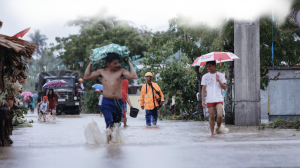Do-It-Together Toolkit for Building Urban Community Resilience

Communities worldwide have greater opportunities for growth and connectedness than ever before; yet the number of people exposed to hazards, shocks, and stresses is rapidly increasing, especially in coastal cities, leading to increased risk and vulnerability. At the same time, people living in cities are themselves agents of change and have significant resources, skills, and capacities to bring to resilience efforts in their own communities and across their cities and districts.
To strengthen their resilience in the face of climate change, cities need an enhanced level of civic engagement that draws on the strength and growing diversity of urban communities and that can effectively complement formal governance structures by engaging a wider set of stakeholders to focus on resilience at the community and household level. Combined with the community-based, neighborhood approaches that community organizations have long invested in, this type of civic engagement in urban settings provides a bottom-up push to accelerate local risk-sensitive decision-making and influence development, governance and investment for effective community resilience outcomes.
To effectively act at these larger scales, organizations must take their current tools and methods and organize them in two new ways:
- To use systems thinking to analyze vulnerability and identify resilience opportunities not just within the community but at the city-scale, and
- To build coalitions of organizations that work together toward common vulnerability reduction and resilience building goals.
The second of these, building relationships and coalitions, is addressed in a companion toolkit. In this toolkit, the focus is on resilience assessment and resilience building, from a foundation of systems thinking.
